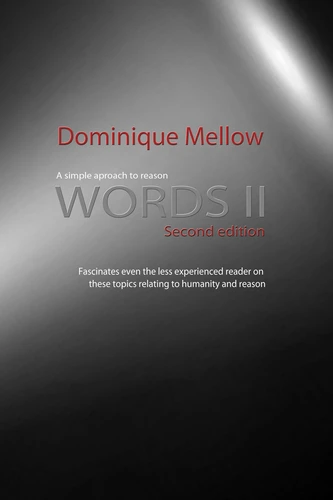Words, A Simple Approach to Reason
Par :Formats :
Disponible dans votre compte client Decitre ou Furet du Nord dès validation de votre commande. Le format ePub est :
- Compatible avec une lecture sur My Vivlio (smartphone, tablette, ordinateur)
- Compatible avec une lecture sur liseuses Vivlio
- Pour les liseuses autres que Vivlio, vous devez utiliser le logiciel Adobe Digital Edition. Non compatible avec la lecture sur les liseuses Kindle, Remarkable et Sony
 , qui est-ce ?
, qui est-ce ?Notre partenaire de plateforme de lecture numérique où vous retrouverez l'ensemble de vos ebooks gratuitement
Pour en savoir plus sur nos ebooks, consultez notre aide en ligne ici
- FormatePub
- ISBN8848773019
- EAN9798848773019
- Date de parution04/10/2022
- Protection num.pas de protection
- Infos supplémentairesepub
- ÉditeurDominique Mellow
Résumé
"Words" is a piece that challenges the meaning of existence and cries out for reason, without which it would be nearly impossible to control our passions, which often demand action but not necessarily in the appropriate way. The author makes a direct appeal to the reader's interest in the need to internalize the concepts that need to guide humanity toward a more dignified port. The author attempts to balance the forces of existence and clear up the misunderstanding that has been ingrained in his beliefs through two dialogues, but he never receives the help he needs, which is analogous to the seeming reality that we currently inhabit.
Idealism is a wish that is articulated and that the author recognizes as unreal but leaves open the possibility that it might be used as a tool to comprehend happiness. The author tries to explain why the loss of faith is regarded as an almost normal attitude in Western culture. The chapters are organized according to the author's intended logic in order to get closer to his innate desire to act morally, which is frequently compromised.
These chapters defy the barriers that are typically put up to prevent the psyche from exploring different avenues for a better understanding of what we urgently need.
Idealism is a wish that is articulated and that the author recognizes as unreal but leaves open the possibility that it might be used as a tool to comprehend happiness. The author tries to explain why the loss of faith is regarded as an almost normal attitude in Western culture. The chapters are organized according to the author's intended logic in order to get closer to his innate desire to act morally, which is frequently compromised.
These chapters defy the barriers that are typically put up to prevent the psyche from exploring different avenues for a better understanding of what we urgently need.
"Words" is a piece that challenges the meaning of existence and cries out for reason, without which it would be nearly impossible to control our passions, which often demand action but not necessarily in the appropriate way. The author makes a direct appeal to the reader's interest in the need to internalize the concepts that need to guide humanity toward a more dignified port. The author attempts to balance the forces of existence and clear up the misunderstanding that has been ingrained in his beliefs through two dialogues, but he never receives the help he needs, which is analogous to the seeming reality that we currently inhabit.
Idealism is a wish that is articulated and that the author recognizes as unreal but leaves open the possibility that it might be used as a tool to comprehend happiness. The author tries to explain why the loss of faith is regarded as an almost normal attitude in Western culture. The chapters are organized according to the author's intended logic in order to get closer to his innate desire to act morally, which is frequently compromised.
These chapters defy the barriers that are typically put up to prevent the psyche from exploring different avenues for a better understanding of what we urgently need.
Idealism is a wish that is articulated and that the author recognizes as unreal but leaves open the possibility that it might be used as a tool to comprehend happiness. The author tries to explain why the loss of faith is regarded as an almost normal attitude in Western culture. The chapters are organized according to the author's intended logic in order to get closer to his innate desire to act morally, which is frequently compromised.
These chapters defy the barriers that are typically put up to prevent the psyche from exploring different avenues for a better understanding of what we urgently need.



